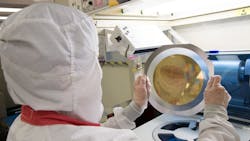BAE Systems eyes gallium nitride (GaN) microelectronics and high electron mobility transistor (HEMT) chips
WASHINGTON – U.S. defense business experts are asking BAE Systems to upgrade gallium nitride (GaN) capabilities in the company's microelectronics center in Nashua, N.H., as part of the 2022 congressional CHIPS and Science Act.
The BAE Systems microelectronics center has received $35 million from the U.S. Department of Commerce in Washington to help purchase new and more efficient manufacturing tools to mitigate supply chain risk, increase production capacity, and reduce the sizes of advanced microelectronics components.
Efficiencies will enable BAE Systems to scale-up in production to meet increasing demand for military technology and provide microelectronics to non-defense industries such as satellite communications (SATCOM) and test-and-measurement equipment, BAE Systems experts say.
The CHIPS and Science Act is to strengthen American manufacturing, supply chains, and national security. Modernizing the BAE Systems microelectronics center helps support this vision and the continued development and manufacturing of cutting-edge technology to serve customers' missions.
The BAE Systems 110,000-square-foot microelectronics center is a U.S. military-accredited, semiconductor chip fabrication and foundry that develops advanced semiconductor technologies beyond those available commercially to meet demanding military requirements.
It is one of the only domestic six-inch gallium arsenide (GaAs) and GaN high electron mobility transistor (HEMT) wafer foundries specifically for military applications, BAE Systems officials say.
"Microelectronics are at the heart of the technology and products we make for our defense and aerospace customers -- from next-generation aircraft and satellites to military-grade GPS and secure communications," says Tom Arseneault, president and CEO of BAE Systems.
